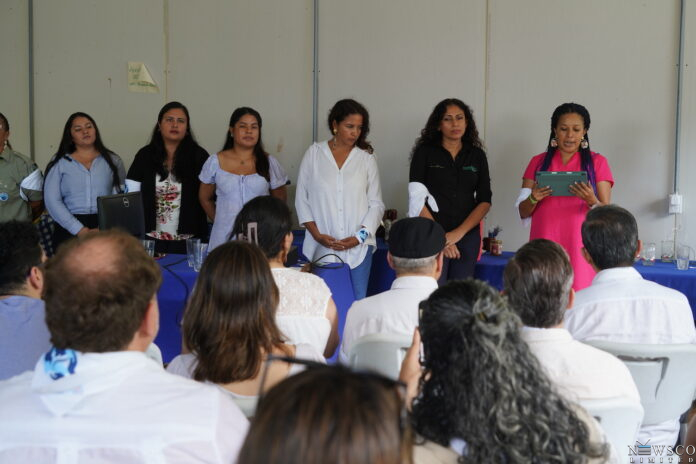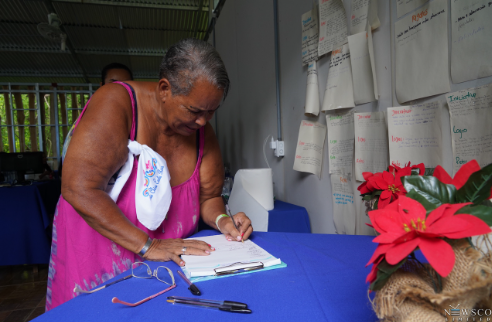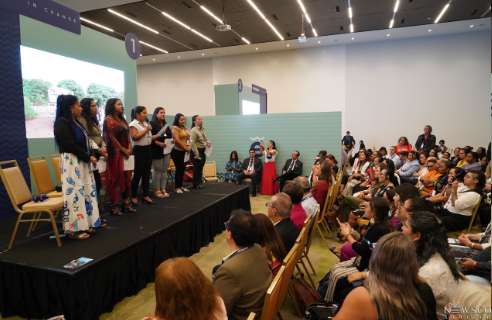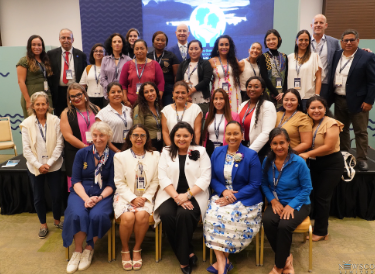
Kenicia Francis
An owner of a local nonprofit organisation was selected to represent Antigua and Barbuda at a regional conference in Isla Chira, Costa Rica.
Jennifer Meranto, founder of Adoptacoastline, and 26 other female coastal leaders from various Latin American countries and Caribbean islands were invited to participate in the Immerse Conference.
The Immerse Conference in Costa Rica is an event that focuses on bringing individuals and organisations together to explore innovative solutions to environmental challenges.
It serves as a platform for sharing knowledge, experiences, and ideas to promote sustainability and conservation efforts.
Meranto explained that she was recommended for the conference by Ruth Spencer who is reportedly from the Global Environmental Fund’s small grants program in Antigua.
She is quite a prominent figure, especially known for her work on women’s issues and environmental conservation.
She founded a women’s coalition within the organisation and is highly respected by many women in leadership roles.
Due to her having a prior engagement, she was unable to attend the conference and recommended Meranto’s participation in the workshop focused on women coastline stewardship leaders.
This workshop, supported by major organisations like the World Conservation Fund and Conservation International, brought the 26 women together to collaborate on coastal conservation efforts.
“Twenty-six of us wrote a call for action from the woman coastline leader’s point of view, to present at the Immerse Conference. We got invited because Ruth represented us. So, we did our presentation with our call to action, and one of the political leaders from Nice, France got involved. She got involved because we raised issues that she didn’t know about. She didn’t really understand part of our proposal about violence,” Meranto explained.
“Because we were in this really safe incubator space, we could talk about all that among ourselves. Some stories came out and people cried. It was very emotional. We felt safe being able to talk about not only physical violence, but to expand and say basically anything that we are not equally allowed to have, whatever we need because of our gender, constitutes as violence against women. As in funding, healthcare, childcare, as in time off from an administration. So that’s sort of what we brought up, that violence is not only when you’re sexually abused, but violence is abuse across the board.”



The call to action highlights the importance of utilizing guidelines like the Voluntary Guidelines for Securing Sustainable Small-scale Fisheries and the Global Biodiversity Framework to promote sustainable practices in coastal and marine areas.
Specifically, emphasising the goal of conserving 30% of these areas through inclusive governance that recognises indigenous territories and the active participation of marine-coastal women in decision-making processes.
By calling on various stakeholders like governments, organisations, and civil society to address issues such as violence and caregiving, the call to action is advocating for a more equitable and supportive environment for marine-coastal women.
It focuses on combating stereotypes, ensuring protection against gender-based violence, and preserving ancestral knowledge to demonstrate a comprehensive approach to promoting gender equality and sustainable practices in marine-coastal zones.
“We didn’t talk about speciesism, which to me is the root of the whole problem. We, as the human species, have been conditioned by this flawed point of view that promotes our biological species as somehow separate from nature. It’s what happened with women and racism. It’s what happened with all the other ‘isms’ – that they all fall from the initial trespass. We trespass against nature looking at it as a resource, not as part of us, when biologically we already know we’re water and minerals. We are atoms and electrons and neurons and so is everything around us. How can we continue to perceive the world as separate from us? If we didn’t do that, we wouldn’t be abusing it. The abuse starts from saying, you’re different from me,” she said.
“The other thing that we got out of it is that we created a coalition. We’re the Women Ocean Guardians and all of us are sharing what’s happening in our communities every day. We’ve never had this before, but it’s wonderful.”
According to an article by posted on programs.wcs.org, Dr Stacy Jupiter, Executive Director for Marine Conservation at the Wildlife Conservation Society (WCS) said, “WCS applauds the Women Ocean Guardians for their courage to challenge the status quo of developing and managing our global seas. We recognise that, particularly for small-holder production sectors, women-led initiatives and associations typically produce outsized results in terms of equity and inclusion, as well as environmental performance. For that reason, WCS has put gender equity at the core of WCS’s community fisheries and marine conservation strategies.”

